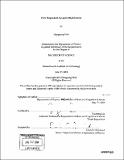Ca2+ dependant synaptic modification
Author(s)
Huh, Dongsung, 1981-
DownloadFull printable version (2.384Mb)
Other Contributors
Massachusetts Institute of Technology. Dept. of Brain and Cognitive Sciences.
Advisor
Guosong Liu.
Terms of use
Metadata
Show full item recordAbstract
It has been assumed that Ca2+ influx of different duration and amplitude would generate different level of potentiation. The conventional protocols of generating LTP have been 1. tetanic stimulation of presynaptic cell, 2. theta burst stimulation of presynaptic cell, and 3. correlated stimulation of pre- and post-synaptic cells. However, the effects of different Ca2+ influx can not be precisely dissected with the conventional protocols for the following defects: 1. the protocols do not discriminate between pre- and post-synaptic side plasticity, 2. the protocols observe synaptic plasticity between two cells which involve multiple synapses with heterogeneous properties, 3. precise control and measurement of the amount of Ca2+ influx are not possible in the protocols. In the present experiment, we perfused glutamate directly on to a single postsynaptic site, depolarized the postsynaptic intracellular potential to a controlled voltage for a controlled duration of time, thus controlling the opening of postsynaptic NMDA receptors and Ca2+ influx. By using this method, we found 1. that modification of synaptic strength has a bell-shaped dependency to the amount of Ca2+ influx, 2. that weak Ca2+ current through desensitized NMDA receptors sustained for a long period of time (160 ms) generates LTD, 3. evidence that phosphorylation of AMPAR leads to insertion of AMPAR.
Description
Thesis (S.B.)--Massachusetts Institute of Technology, Dept. of Physics; and, (S.B.)--Massachusetts Institute of Technology, Dept. of Brain and Cognitive Sciences, 2004. Includes bibliographical references (p. 21-22).
Date issued
2004Department
Massachusetts Institute of Technology. Department of Brain and Cognitive Sciences; Massachusetts Institute of Technology. Department of PhysicsPublisher
Massachusetts Institute of Technology
Keywords
Physics., Brain and Cognitive Sciences.